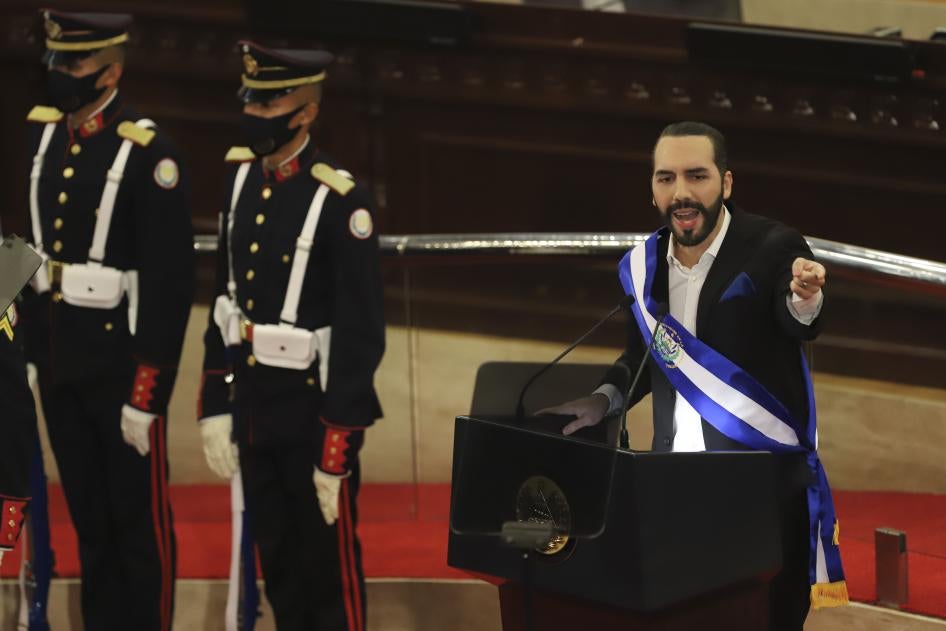(Washington DC) – Two laws passed by El Salvador’s Legislative Assembly on August 31, 2021, threaten judicial independence by allowing authorities to dismiss all judges and prosecutors who are 60 years old or older, Human Rights Watch said today.
The bills passed by the Legislative Assembly, which is controlled by supporters of President Nayib Bukele, said that judges and prosecutors age 60 or above will immediately “cease their functions.” While it is not clear how many judges will be affected, some estimates indicate that over 200 of the about 700 judges in the country may be ousted and replaced by judges appointed by the Supreme Court, which Bukele’s allies in the Assembly recently packed.
“Since Bukele’s supporters took control of El Salvador’s Assembly in May, they have taken drastic measures that appear aimed at destroying the independence of the Supreme Court and the Attorney General’s Office,” said José Miguel Vivanco, Americas director at Human Rights Watch. “These laws seem designed to ensure government control over a large number of lower-level judges and prosecutors.”
The new legislation will apply to all judges and prosecutors, except those on the Supreme Court of Justice. Previously, the law did not set a mandatory retirement age for judges and said that they could retire after 35 years of service.
The new laws allow the Supreme Court to extend the term of judges who are 60 or older “due to reasons of necessity or specialty” and the attorney general to extend the term of prosecutors “for reasons of convenience” or “due to the complexity or specialty of their services.” Such provisions are vague and could easily be used to reward judges and prosecutors loyal to the government while ensuring that only those who are independent or perceived as independent are ousted, Human Rights Watch said.
Since he took office in 2019, President Bukele has undermined basic democratic checks and balances. He has publicly defied rulings by the Constitutional Chamber of the Supreme Court prohibiting arrests for violations of Covid-19-related measures and accused judges of being “genocidal.”
In February, his party, Nuevas Ideas, won a two-thirds majority in the Assembly. On May 1, hours after the pro-Bukele Assembly was seated, legislators ousted and replaced all the judges of the Supreme Court’s Constitutional Chamber, as well as the Attorney General. The lawmakers clearly took the action, in violation of international standards on judicial independence, because they disliked the judges’ rulings.
In late June, the Assembly appointed five new Supreme Court judges, without transparency or open deliberation and in violation of the process set out in the Constitution and the Assembly’s own internal rules. Each time the legislature changes, the law allows the newly constituted body to appoint 5 of the 15 Supreme Court judges. However, the new Assembly controlled by Bukele’s allies has appointed 10.
Under international human rights standards, El Salvador should safeguard the independence and impartiality of its judiciary. A range of authoritative instruments – including the United Nations Basic Principles on the Independence of the Judiciary, the Universal Charter of the Judge, and the Statute of the Ibero-American Judge – set forth key components of an independent and impartial judiciary. These include the requirement that judges be free from constraints, pressures, or orders imposed by other branches of government, and security of tenure so that they do not fear being removed from their posts for their decisions.
Under the Universal Charter on the Judge, changes to the obligatory retirement age for judges “must not have a retroactive effect.”
While governments are in principle free to determine the mandatory retirement age of their judges, the United Nations special rapporteur on the independence of judges and lawyers has criticized similar legislation that retroactively lowers the mandatory retirement age for judges as a “flagrant breach of the principles of security of tenure.” The special rapporteur has also called on governments to ensure that new retirement regimes are only applicable to judges who have “taken up their functions following the entry into force of the law.”









